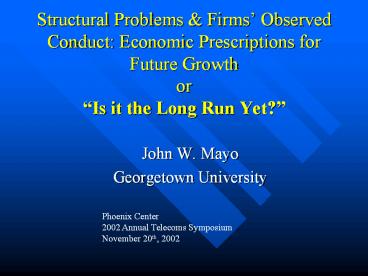Structural%20Problems%20 - PowerPoint PPT Presentation
Title:
Structural%20Problems%20
Description:
Coast-to-coast call --$.55/minute. 2002. Hundreds of LD firms (choice typically 25) ... Demonstrated willingness to switch. Coast-to-coast call $.07/minute. ... – PowerPoint PPT presentation
Number of Views:219
Avg rating:3.0/5.0
Title: Structural%20Problems%20
1
Structural Problems Firms Observed Conduct
Economic Prescriptions for Future GrowthorIs
it the Long Run Yet?
- John W. Mayo
- Georgetown University
Phoenix Center 2002 Annual Telecoms
Symposium November 20th, 2002
2
A Long-Run Perspective
- In the Long Run, were all dead.
- John Maynard Keynes
- A Tract on Monetary Reform
- Economists set themselves too easy, too useless
a task if in the tempestuous seasons they can
only tell us that when the storm is past the
ocean is flat again.
3
The Vision of Post-Act Competition
Post-Divestiture
Pre-divestiture
Post-Act
Long lines
ATT
MCI
IXC
MCI
LD BOC
LD
BOC
CLEC
BOC
BOC
4
Long-Distance Telecommunications
- Pre-divestiture
- Little or no consumer choice
- ATT share 90
- One nationwide network
- Dialing disparity
- No demonstrated ability of competitors to expand
- Willingness to switch
- Coast-to-coast call --.55/minute
- 2002
- Hundreds of LD firms (choice typically gt25)
- ATT Share 40
- Dialing parity
- Scores of Facilities-based competitors
- Demonstrated willingness to switch
- Coast-to-coast call ? .07/minute.
5
The Benefits of Long Distance Telecommunications
Competition
- The policies put in place in the
telecommunications industry over the past two
decades have dramatically increased competition
in the long-distance industry and have created
billions of dollars of consumer surplus.
6
The Vision of Post-Act Competition
Post-Divestiture
Pre-divestiture
Post-Act
Long lines
ATT
MCI
IXC
MCI
LD BOC
LD
BOC
CLEC
BOC
BOC
7
Guiding Economic Principles
- 1 Entry by a monopolist into an effectively
competitive market can lessen competition - 2 Entry by a competitor into a monopolized
market unequivocally enhances competition and - 3 Entry by a competitor with no monopoly power
into an effectively competitive market cannot
harm competition.
8
Opening Local Exchange Markets
- Unrestricted Resale
- Facilities-based entry
- Unbundled Network Elements (UNEs)
- Rates shall be based on cost
- Nondiscriminatory
- May include a reasonable profit
9
Subsequent Developments in Local Exchange Markets
- Initially, a great deal of interest/entry
- Difficult battles over resale and UNE rates
- Entry met with ongoing operational difficulties
- Substantial operational and pricing issues remain
10
Bankrupt and Discontinued Telephony Entrants
11
Sabotaging Competition
- Virginia Cavalier Telephones premature
disconnects - Pennsylvania intra-company billing
- Bell South found to have Provided preferential
and discriminatory service to itself and to the
detriment of other customers. - SBC fined for failure to provide
non-discriminatory access (72 fines- 9/96-4/02) - Bell South proposes Tariff to discount price of
access based on access customers percentage
growth rate
12
The Current Status of Local Exchange Competition
- Reduced number of RBOCs
- Some inroads, principally for high-end business
customers - ILECs still retain roughly 90 share of access
lines nationally - Many new entrants are dead or dying
13
14
The Historical Role of Regulators
- Underlying Premise Natural Monopoly
- Regulators Role Protect Consumers by Disabling
Monopoly Power
15
The many meanings of Deregulation
- Deregulate price but not entry
- Cable TV (1984)
- Deregulate entry but not price
- Long Distance Telephone (1984-1995)
- Deregulate wholesale but not retail
- California Electricity (2001)
16
Lessons from Deregulation
- Monopolies will not willingly cede their monopoly
positions - Network industries poise the biggest challenges
for deregulation (trucking v. local
telecommunications) - Policies that implicitly deny access at one
vertical stage in network industries will deny,
delay and denigrate competition at all stages - The path to deregulation is hard and if not done
right will backlash (California?)
17
Lessons for Regulatory Policy
- Old Model of Regulation Disabling monopoly power
by protecting consumers from monopoly power and
monopoly from entrants - New Model of (DE)Regulation Enabling competition
by opening markets
18
Competition-Enabling Policies
- Policies to Promote Competition
- Eliminate regulatory barriers to entry
- Assure access
- Efficient Prices
- Identify areas of continued monopoly
- Policies to Protect Competition
- Unbundling
- Imputation
- Unrestricted resale
- Be alert to sabotage
19
A Man for All Seasons
- Sir Thomas More Well, take me home.
- Boatman From Richmond to Chelsea, a penny
halfpennyfrom Chelsea to Richmond, a penny
halfpenny. From Richmond to Chelsea, its a
quiet float downstream. From Chelsea to
Richmond, its a hard pull upstream. And its a
penny halfpenny either way. Whoever makes the
regulations doesnt row a boat.
20
Lessons LearnedWhere do we go from Here?
- Will only get one bite of the competitive apple
- The path to facilities-based competition is
through UNEs and resale - No time to be timid (Tough Love)
- Competition must precede deregulation
21
The Impact of Experts
- Now that Im here, well turn the program around
360 degrees. - Jason Kidd
- Dallas Mavericks No. 1 draft pick talking































